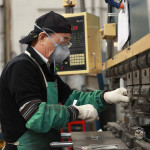 In manufacturing, as in many other businesses, the old wisdom is to save as much money as possible to improve the profit margin. This is one of the primary reasons why so many purchasing managers from so many companies have turned to the cheap labor available in overseas markets for their manufacturing needs. The logic here is “because the labor’s cheaper, the parts and materials will be cheaper.”
In manufacturing, as in many other businesses, the old wisdom is to save as much money as possible to improve the profit margin. This is one of the primary reasons why so many purchasing managers from so many companies have turned to the cheap labor available in overseas markets for their manufacturing needs. The logic here is “because the labor’s cheaper, the parts and materials will be cheaper.”
But, is that really true?
In a recent editorial for Inc.com, Marlin Steel’s president examined the question of whether or not buying from foreign manufacturers in China is really more cost-effective than purchasing from a U.S.-based manufacturer. The answer may surprise you.
Why Buying from U.S. Manufacturers is the Best Choice
When making a purchase order for parts and materials from a Chinese or other overseas manufacturer, it can be tempting to look only at the price tag of the items being ordered and forget about other costs associated with said order. Things such as shipping & handling charges, customs duties, import/export taxes, insurance, and delays in production caused by long shipping times all add to the total cost of ownership in ordering from an overseas manufacturer.
When ordering from a U.S.-based company, however, many of these additional cost of ownership expenses are greatly reduced or even non-existent. For example, when purchasing from a U.S. manufacturer, you don’t have to wait for 4-8 weeks for a cargo ship to not only be available, but actually make the delivery. Not only that, but you still need to arrange for shipment of parts from the port to your factory as well. Instead, a U.S. manufacturer can load your order onto a truck as soon as it’s complete and ship to your manufacturing/distribution center right away for a fraction of the cost.
Another concern when buying parts is their overall quality. When buying cheap parts made with cheap labor, you get what you paid for. This can be a problem because when the time comes to distribute your own product made using said parts, it’s your company’s reputation that is put on the line. Not only that, but if those parts don’t all conform to a precise set of dimensions, they can make using them in your product line impossible. Parts that have to be rejected represent money wasted.
U.S. manufacturers that use skilled workers, engineers, and precise automated manufacturing techniques can deliver consistent, reliable results, meaning fewer rejected parts that cannot be used for your application. For example, here at Marlin Steel, we use a Trumpf laser cutter and a punch machine that each have a margin of error of 0.004” (the thickness of an average human hair) for every operation. For bending metal forms, a press brake machine can make bends that are accurate to within 0.1 microns, or 1/40th the width of a human hair. This is a level of precision that is, quite frankly, impossible on a large scale using purely human labor.
Not only are products made in America using high-tech assembly methods more uniform in shape and size than products made using manual labor, manufacturing is much quicker as well. For example, as pointed out in the full Inc.com article, Nathan, one of Marlin’s dedicated robot setup operators, operates a four robot manufacturing cell that can complete 20,000 complex, high-precision bends per hour. These robots won’t get worn out as the day goes on, so they’ll keep making bends with the same level of precision and at the same pace all day, every day.
On top of all of the above, when you’re dealing with a U.S.-based company for the manufacture of your goods, you know that you’re dealing with a company that is being regulated by the same laws and standards as your own. If a dispute arises between your company and an overseas manufacturer, their local trade authorities will naturally have a pre-existing preference for their own company. In dealing with a U.S. company, it is usually easier to get a fair arbitration over your dispute.
In short, with U.S. companies, you get faster shipping, faster manufacturing, better quality, less red tape, quicker time-to-market, better management/regulation of transactions, and fewer extraneous ownership costs related to shipping products from one side of the planet to the other.
To learn more about the advantages of using a U.S.-based manufacturer, read the full Inc.com article.

.gif)


